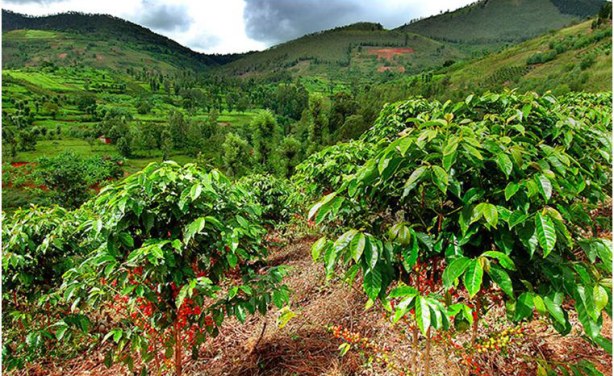 |
| Nyinawumuntu’s coffee plantation in Kayonza |
Foodfarmnewstv
FADAMA 111 PROJECT ADDITIONAL FINANCING
Bestchange
Search This Blog
Labels
- News (460)
- Images speak (42)
- Press Release (39)
- livestock (31)
- FACAN (29)
- Editorial (25)
- GM (20)
- Seed (20)
- Biotechnology (19)
- wheat (16)
- Research (15)
- Cassava (14)
- AFAN (13)
- Global news (12)
- Special Report (12)
- Rice (11)
- Image Speaks (9)
- Maize (9)
- Soil (9)
- Yam (8)
- Bt cowpea (7)
- Coconut (7)
- Fertilizer (7)
- Cocoa (6)
- Disease (6)
- Ginger (6)
- Potato (6)
- World Soil Day (6)
- Animals (5)
- Apple (5)
- Oil Palm (5)
- Tomatoe (5)
- new (5)
- Cashew (4)
- Climate change (4)
- Fish (4)
- NCARD (4)
- Organic agric (4)
- World Food Day (4)
- Interview (3)
- National Council meeting on Agriculture. (3)
- Plant & genes (3)
- Plant genes (3)
- Project (3)
- Sesame (3)
- Shea butter (3)
- AI Research on Agriculture (2)
- Achia (2)
- African Cherry (2)
- Communique (2)
- Cotton (2)
- Extension services (2)
- Gene editing (2)
- HAPPY NEW YEAR (2)
- Horticulture (2)
- Insurance (2)
- Kenaf (2)
- Opinion (2)
- Sorghum (2)
- Sunflower (2)
- Tomato (2)
- Turmeric (2)
- bt cotton (2)
- seasons greetings (2)
- Artemesia (1)
- Biodiversity (1)
- Birds (1)
- Carrot (1)
- Discovery (1)
- Donkey (1)
- Facts sheets (1)
- Flash Flood (1)
- GES (1)
- GMO Rice (1)
- Garlic (1)
- Genetic (1)
- Groundnut (1)
- Jute bag (1)
- Locust bean (1)
- MERRY XMAS (1)
- Machinery (1)
- Mango (1)
- Milk (1)
- Okra (1)
- Post-harvest losses/ Food Waste (1)
- Presentation (1)
- Seaweed (1)
- Senate (1)
- Soybean (1)
- Tumeria (1)
- Walnut (1)
- flood (1)
- fruits (1)
- millet (1)
- water (1)
Total Pageviews
SPONSORED

Nigerian Institute of Soil Science- NISS
Translate Food Farm News to Hausa, Igbo, Yoruba and over 100 Languages
Latest News
Friday, 3 May 2019
Coffee Farmers Seek Govt Support
Thursday, 2 May 2019
Recycled gypsum as an agricultural product
| Recycled gypsum as an agricultural product |
Wednesday, 1 May 2019
Leaves are nature's most sophisticated environment sensors
 |
| Leaves are nature's most sophisticated environment sensors |
Tuesday, 30 April 2019
Insects hijack reproductive genes of grape vines to create own living space on plant
 |
| Insects have set up house in phylloxera galls on this leaf. This cross-section of a gall taken with a stereosmicroscope shows an insect mom -- the orange ball in the center -- surrounded by eggs she laid -- the surrounding yellow ovals. |
A team of scientists at The University of Toledo uncovered new, galling details in the intimate relationship between insects and plants, opening the door to new possibilities in protecting the source of wine and raisins worldwide from a major agricultural pest.
Monday, 29 April 2019
Boost for Australian grain industry
| grain |
New findings from research by La Trobe University and CSIRO made possible with GRDC investment could lead to a significant increase in the Australian wheat crop yield -- adding potentially around $1.8 billion to the national economy and improving global food security.
SSSN Fellow Award 2019: Call for Nominations

The Soil Science Society of Nigeria
(SSSN) as a tradition confers the society’s “Fellow” award to deserving members for outstanding teaching
and/or researchor services in the field of Soil Science and substantial
contribution to the Soil Science Society of Nigeria (SSSN) with a minimum
of 10 [ten] active [ continuous] years of
registered membership.
Images speak @ the just concluded 43rd National Council on Agriculture and Rural Development (NCARD) which held in Abia state.
Sunday, 28 April 2019
Nematode odors offer possible advantage in the battle against insect pests
 |
| Nematode odors offer possible advantage in the battle against insect pests |
Gardeners commonly use nematodes to naturally get rid of harmful soil-dwelling insects. A new study published today in the journal Functional Ecologyrevealed that these insect-killing nematodes also produce distinctive chemical cues, which deter Colorado potato beetles and make potato leaves less palatable to them.
Saturday, 27 April 2019
The paper mulberry coevolved with soil microbes to humanity's benefit
 |
| The paper mulberry coevolved with soil microbes to humanity's benefit |
The paper mulberry evolved its uniquely fibrous inner bark around 31 million years ago, long before the woody tree was first used for bookmaking during China's Tang dynasty.
Friday, 26 April 2019
Future of US citrus may hinge on consumer acceptance of genetically modified food
| Future of US citrus may hinge on consumer acceptance of genetically modified food |
A tiny insect, no bigger than the head of a pin, is threatening to topple the multibillion-dollar citrus industry in the U.S. by infecting millions of acres of orchards with an incurable bacterium called citrus greening disease.
Subscribe to:
Posts (Atom)





